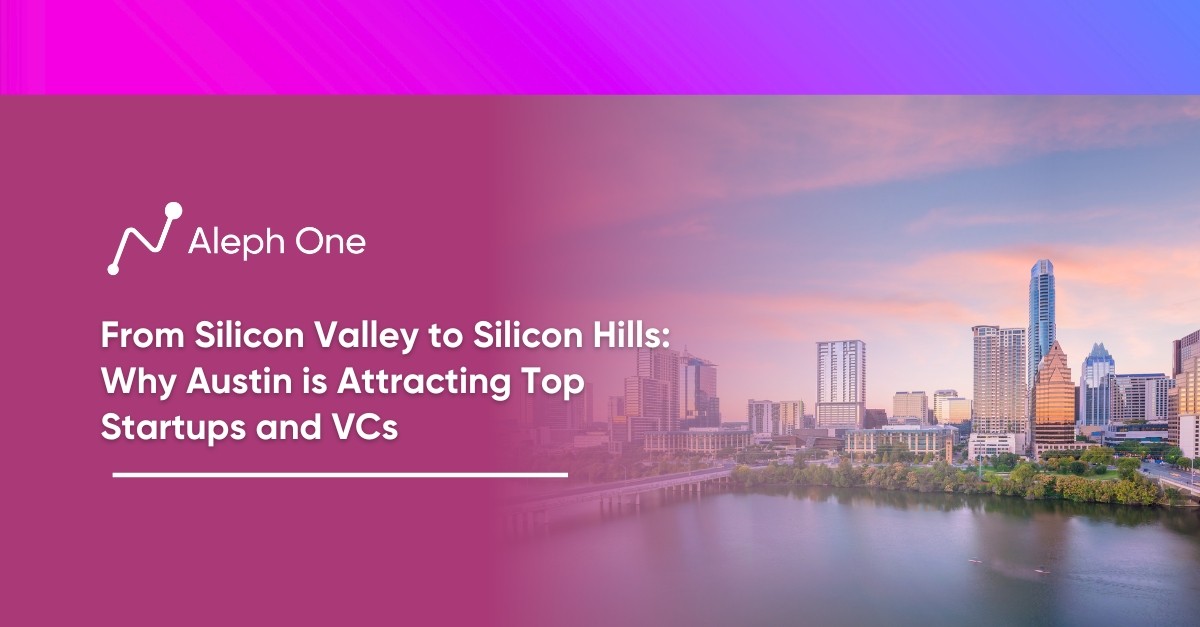Let’s work together to build something amazing. Share your project details and our team will reply to figure out the next steps to your success.

From the quiet college town it once was, Austin has become a tech capital that beckons startups and venture capitalists alike. Nestled in the heart of Texas, this unassuming city transformed remarkably into the vibrant tech hub known as “Silicon Hills.” The journey began in the 1980s, as pioneering tech giants like IBM and Dell set up shop, drawn by the allure of business-friendly policies, a refreshing outdoor lifestyle, and the undeniable rhythm of the “Live Music Capital of the World.” As the years unfolded, Austin’s tech landscape diversified, witnessing legendary companies’ birth, homegrown unicorns’ rise, and the embrace of significant tech players from Silicon Valley. In this article, we explore Austin’s tech trajectory, discover the secrets behind its magnetic pull on innovators and investors, and examine its challenges in maintaining its soaring ascent. From Silicon Valley to Silicon Hills, Austin’s story is an irresistible tale of ambition, talent, and an unwavering spirit that continues to shape the future of tech.

Austin’s Humble Startup Roots: How a Sleepy College Town Became a Tech Capital
Austin began as a sleepy college town, home to the University of Texas at Austin. In the 1980s, Austin’s tech scene grew with the arrival of IBM and companies like Dell, Freescale Semiconductor, and National Instruments. Austin’s appeal was enhanced by its business-friendly policies, outdoor lifestyle, and live music scene.
IBM – Starts Manufacturing Plant in Austin
In the 1980s, IBM opened a manufacturing plant in Austin that produced personal computers. Dell was founded in 1984 by UT Austin student Michael Dell, growing into a Fortune 500 company and Austin’s most prominent tech employer. Chipmaker Freescale Semiconductor spun out of Motorola in Austin in 2004. These anchor companies helped establish Austin as a center for hardware and semiconductor companies.
Austin’s Quality of Life Attracts Tech Talent
Austin’s warm weather, lakes, and parks offer opportunities for outdoor recreation. Austin’s live music scene and cultural vibrancy as “The Live Music Capital of the World” appealed to young professionals. Austin also had a relatively low cost of living compared to tech hubs like Silicon Valley.
Software, Ecommerce, and Web Services
In the 1990s and 2000s, Austin’s tech industry diversified beyond hardware into software, e-commerce, and web services. Companies like Trilogy, HomeAway, and Bazaarvoice were founded and grew rapidly. Austin earned the nickname “Silicon Hills” as its tech scene rose.
Texas’s Business Friendly Policies Attract Startups
Major tech companies took notice and opened offices in Austin, including IBM, Dell, Apple, and Google. Austin’s appeal was magnified by Texas’s business-friendly policies, including no state income tax. Venture capital firms like Austin Ventures and Silverton Partners launched to fund Austin startups.
By the 2010s, Austin’s tech industry was booming. Homegrown “unicorn” companies like Indeed, RetailMeNot, and BigCommerce achieved billion-dollar valuations. Tech talent flocked to Austin, drawn by its lifestyle, companies, and affordability.
From Silicon Valley to Silicon Hills: Why Tech Giants and Venture Capital Came to Texas
Major tech companies and venture capital firms have flocked to Austin in recent years, attracted by the city’s lower costs of doing business, available tech talent, and appealing lifestyle. Some of the biggest names in tech have established offices in Austin, including Google, Facebook, Oracle, and Apple. Top-tier VC firms like Sequoia, Greylock, and Benchmark have invested heavily in Austin startups.
Google, Facebook, and Oracle Move to Texas
In 2007, Google opened its first Austin office, growing to over 800 employees today working in engineering, sales, and more. Facebook launched its Austin presence in 2010, now with nearly 200 employees in engineering roles. Oracle acquired Austin-based Retek in 2005, expanding to over 2,500 employees. And Apple’s Austin campus now employs over 6,000, its second-largest in the Americas.
Engineer and Computer Science Talent from UT Austin
The availability of engineering and computer science talent from the University of Texas at Austin and other area schools has drawn major tech companies to the region. Austin’s lower costs of living and real estate compared to Silicon Valley have also been a key factor, allowing companies to pay employees competitive salaries while operating at lower costs.
Venture Investments Rise
Venture investment in Austin startups has surged over the past decade. According to data from Pitchbook, VC funding in the Austin metro area rose from $140 million in 2010 to over $1.6 billion in 2019. Significant deals include Sequoia’s $150 million investment in Indeed in 2012 and Greylock and Benchmark’s $30 million funding round for BigCommerce in 2015.
While Silicon Valley will likely remain the epicenter of tech innovation, Austin has cemented its status as a hub for major tech companies and venture investment. With a pipeline of talent from local schools, an outdoor-oriented lifestyle, and lower living costs, Austin has proven an appealing market for tech giants and venture firms alike. “Silicon Hills” is now a significant part of Texas’s technology success story.
Austin’s Unicorn Stampede: How Homegrown Startups Achieved Billion-Dollar Valuations
Some of Austin’s most successful tech companies were born and bred in the city, growing from small startups into unicorns with billion-dollar valuations. Job search engine Indeed, coupon company RetailMeNot, vacation rental marketplace HomeAway, and ecommerce platform BigCommerce are all Austin-founded unicorns that shaped the city’s tech success.
Indeed
Indeed was founded in Austin in 2004 by Paul Forster, Rony Kahan, and Craig Silverstein. The company pioneered job search optimization and grew quickly, receiving funding from venture firms like Union Square Ventures. In 2012, Indeed was acquired by Recruit Co. Ltd. for $1 billion, Austin’s first unicorn exit. Today, Indeed employs over 10,000 people, with its headquarters and much of its staff still in Austin.
RetailMeNot
RetailMeNot launched in Austin in 2007, pioneering digital coupon codes and deals. Under CEO Cotter Cunningham, RetailMeNot grew rapidly and held an IPO in 2013, raising over $200 million. Though later acquired, RetailMeNot remains headquartered in Austin with over 450 local employees. HomeAway, founded in 2005, built a leading vacation rental marketplace and was acquired by Expedia for $3.9 billion in 2015 while still operating independently in Austin.
BigCommerce
BigCommerce, an ecommerce platform for SMBs, became Austin’s latest unicorn in 2020 with a $150 million funding round led by Goldman Sachs. BigCommerce was founded in Sydney but relocated its headquarters to Austin in 2011. It now employs over 700 people locally.
Startup Unicorns Impact on Austin’s Tech Ecosystem
Austin’s homegrown unicorns have immensely impacted the city’s tech ecosystem. They have brought thousands of jobs, attracted outside investment, and inspired new startups. Their success stories prove that Austin has the talent, environment, and community to build companies from scratch into global powerhouses. While acquisitions pose risks to Austin’s tech independence, companies like Indeed, HomeAway, and BigCommerce show that unicorns can continue to thrive locally even after exiting. With its strong base of experienced tech talent and startup resources, Austin is poised to produce many more homegrown unicorns in the coming years.
An Oasis of Affordability: Why Austin’s Housing and Living Costs Help Recruit Top Talent
Austin’s relatively low cost of living, especially compared to Silicon Valley and other major tech hubs, has been instrumental in attracting and retaining top talent. While home prices and rents have risen over the past decade as more companies and workers have flooded into the city, Austin remains an oasis of affordability compared to other hotspots.
Austin Housing Affordability
According to Zillow, the median home value in Austin is around $300,000, less than half that of San Francisco and San Jose. Rent for a one-bedroom apartment in Austin averages under $1,200 per month, compared to over $3,000 per month in San Francisco. This substantial cost savings allows workers to enjoy a high quality of life in Austin on a lower salary. For younger tech workers especially, Austin’s affordability is highly appealing.
Startups Can Pay Lower Salaries Compared to Silicon Valley
Affordability has also been crucial for companies, allowing them to pay lower salaries while still attracting skilled workers. As more tech giants have opened offices in Austin, they have increased wages to compete for talent, but pay remains lower overall than in Silicon Valley. If living costs rise significantly, Austin may lose some of its competitive edge in attracting talent and startups.
Challenges of Workers Moving to Austin
Some worry that as more Californians and tech companies flock to Austin, housing costs will spike, and the city will become unaffordable for longtime residents. While home prices have risen sharply over the past few years, Austin’s housing market remains relatively attainable for buyers compared to other major metros. However, if affordability declines substantially, it may be more difficult for companies to recruit workers, especially younger and lower-income talent.
Austin’s mix of vibrant culture, outdoor lifestyle, and strong job market continues to attract new residents, but its affordability is what seals the deal for most. Suppose Austin can find ways to scale its infrastructure and housing to accommodate growth while maintaining relatively low costs of living. In that case, it will remain an appealing tech hub for companies and workers. But suppose housing prices spike and traffic worsens. In that case, Austin’s affordability advantage may erode – and with it, the city’s ability to attract top talent. Overall, affordability will be a key factor in Austin’s future as a destination for tech workers and startups.
Traffic and Talent Wars: Challenges to Austin’s Tech Growth
Austin’s rapid growth as a tech hub has brought two key challenges: traffic and transportation issues and shortages of skilled tech talent. Austin’s infrastructure has struggled to keep up with the city’s population boom over the past decade. Lengthy commute times and traffic congestion are some of the biggest downsides to living in Austin, especially as the city has grown more expensive. The situation is poised to worsen without major public transit and road infrastructure investments.
Competition for Skilled Engineers and Technical Roles
At the same time, Austin’s tech companies face stiff competition for skilled workers, especially in software engineering and other technical roles. While Austin’s lower costs of living and vibrant culture have attracted younger tech workers, some report needing help to fill critical positions – and having to pay higher salaries to do so. The city produces fewer tech graduates than tech hubs like San Francisco and Seattle and faces competition from other emerging hubs for available talent.
Traffic and Lack of Public Transportation
Some industry leaders argue these challenges threaten to curb Austin’s tech growth if left unaddressed. In a recent survey, over half of Austin tech executives reported that traffic and lack of public transit options pose a severe problem for their companies. And research from the Austin Chamber of Commerce suggests that talent shortages in crucial tech occupations may cost the city up to $21 billion per year in potential economic impact.
Solutions for Austin’s Public Transit Problem
Proposed solutions include improving Austin’s public transit, building denser housing near significant employers, and boosting tech education and workforce training programs. Ride-sharing companies like Uber and Lyft also aim to reduce traffic, and some tech companies offer employee shuttles and subsidized transit benefits. While Austin’s lower living costs provide a buffer, housing affordability must be maintained to continue attracting top talent and younger tech workers.
Austin’s rapid emergence as a tech powerhouse has outpaced the city’s infrastructure and talent development. With proactive investments and policy solutions, Austin can overcome these challenges and continue its upward trajectory. But action is necessary for the city’s traffic and talent wars to stall its tech growth.
Austin’s Tech Horizon: What’s Next for the Silicon Hills?
Austin has come a long way from its sleepy college town roots to emerge as a central tech hub, but its rise is far from over. Austin’s appealing lifestyle, business climate, and affordability that initially attracted tech companies and talent are still present. Austin’s tech scene is poised for continued success if the city can address critical challenges like transportation, affordability, and talent supply.
Incubators and Venture Funding
Austin’s startup ecosystem is gaining momentum, with new incubators and accelerators launching and venture funding on the rise. As more startups achieve unicorn status or exit through acquisition, their founders and employees gain experience to build or fund new companies. This cycle of entrepreneurship and reinvestment in the local tech scene will accelerate Austin’s growth. Major tech companies are also expanding in Austin, with new offices and jobs announced regularly by firms like Google, Facebook, and Oracle.
Improving Infrastructure
Austin must improve infrastructure and housing to support future tech growth. Plans for expanded public transit and transportation solutions are in the works to address Austin’s traffic problems. City leaders are also working with companies to develop affordable housing for tech workers with average salaries. If Austin can implement these plans effectively without losing its charm, the city will be in a solid position to attract more companies and talent.
Silicon Hills vs. Silicon Valley
Compared to Silicon Valley and other leading tech hubs where costs of living and doing business are high, Austin remains an oasis of affordability. This competitive advantage, combined with Austin’s cultural cool factor and natural beauty, means Silicon Hills is poised to gain more prominence on the global tech stage. While Austin may never match Silicon Valley in scale, its lower density and cheaper costs mean it has room to grow as a hub for startups and tech companies focused on lifestyle. Austin can develop its talent base for an innovation-based economy by improving infrastructure and education.
Austins Silicon Hills Could Be the Home of the Next Big Startup
With its vibrant city life, natural surroundings, and appealing affordability, Austin is uniquely positioned to continue attracting and developing tech talent. While facing challenges familiar to tech hubs, Austin has the potential to forge its path forward as an unconventional Silicon Valley alternative. The future is bright for Austin’s tech horizon as Silicon Hills.
FAQ
How did Austin's transformation from a sleepy college town to a major tech hub occur and what were the significant moments in this transition?
Austin’s transformation from a sleepy college town to a major tech hub can be traced back to the 1980s when IBM and companies like Dell and National Instruments opened their offices. This growth diversified into software, e-commerce, and web services in the 1990s and 2000s. Some other significant moments include the arrival of major tech companies like Google, Facebook, Oracle, and Apple. Also, Austin’s emergence as a locale for billion-dollar startups (or unicorns) such as Indeed, RetailMeNot, and BigCommerce played a key role in this transformation.
What benefits does Austin provide to tech companies and venture capitalists, making it an attractive choice for them to set up their operations?
Austin provides several benefits to tech companies and venture capitalists. One of the major attractions is the availability of tech talent, especially from the University of Texas at Austin. Moreover, compared to tech hubs like Silicon Valley, the lower costs of living and real estate make it easier for companies to offer competitive salaries while operating at lower costs. Also, Austin’s outdoor lifestyle, cultural vibrancy, and the tag of “The Live Music Capital of the World” make it appealing to tech professionals, further attracting companies and venture capital firms.
What are some of the primary challenges Austin is facing due to its rapid growth as a tech hub, and how can those be addressed?
Two key challenges Austin faces due to its rapid tech growth are transportation issues and a shortage of skilled tech talent. These challenges can be addressed by investing in public transit and road infrastructure to mitigate traffic congestion. Furthermore, efforts to boost tech education, workforce training programs, and advancing housing plans could help maintain a steady supply of skilled tech talent and keep living costs affordable, thereby ensuring the continued growth of the tech hub.
Get the latest news and updates from Aleph One in your inbox.



